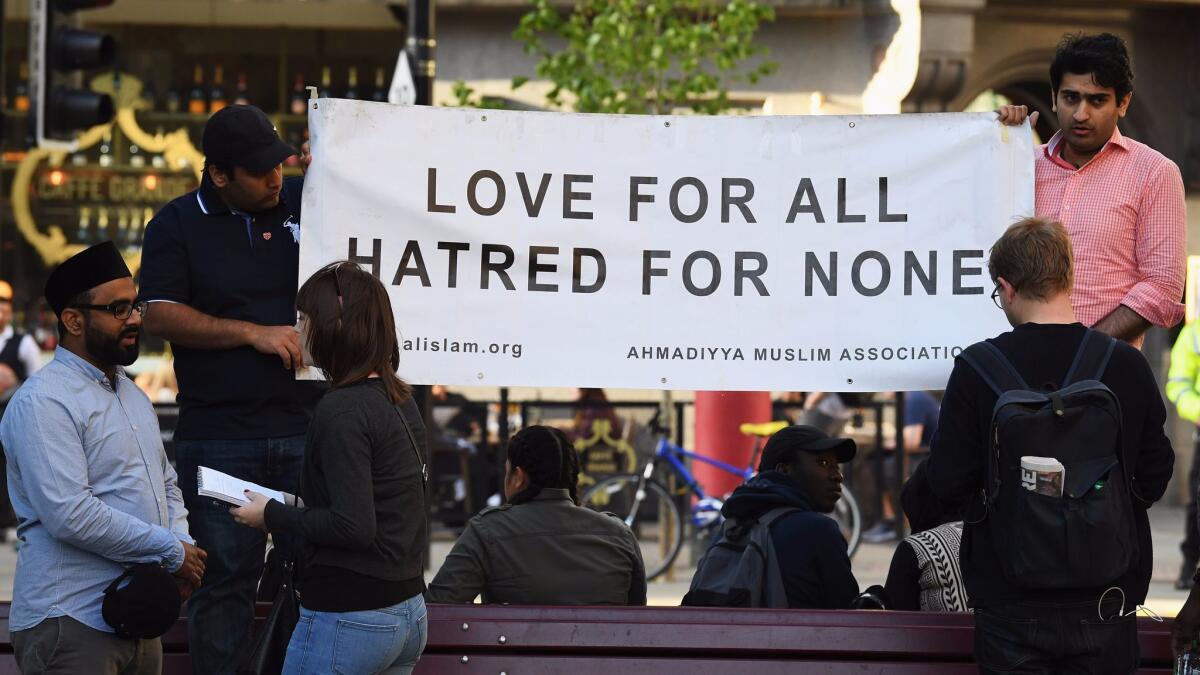Members of Manchesterâs Muslim community among those most strongly condemning deadly bombing

Reporting from Manchester, England â Greater Manchester police ran a mock anti-terrorist operation a year ago featuring a bomber shouting in Arabic, âAllahu akbar,â or God is great.
Eight hundred volunteers took part in the overnight drill at a huge shopping center on the outskirts of the city to make it as realistic as possible and prepare the cityâs emergency services for an attack.
But the day after the practice drill, authorities apologized to the cityâs Muslim community and admitted they had been guilty of stereotyping.
After Monday nightâs suicide bombing, many Manchester residents praised police, fire and ambulance workers for their rapid response. The 22-year-old suspect in the suicide bombing, for which the Islamic State extremist group claimed responsibility, was described as an English-born son of Libyan immigrants.
Muslim leaders were among those who were quick to condemn the attack, which killed 22 people and wounded dozens, and declare that the city would not be divided.
Mohammed Shafiq, the chief executive of Ramadhan Foundation in Manchester, said in a statement that the deadly explosion after an Ariana Grande concert was the âdarkest dayâ in the cityâs history.
Shafiq said the people of Manchester would not be divided and would instead âmourn, remember the victims and get on with our lives.â
âI love Manchester and its people â we are a resolute people and will not be divided by these barbaric animals or cowered by their violence,â he said.
Mohammed Saeed Saeiti, the imam at a mosque attended by the suspected suicide bomber, Salman Abedi, considered him dangerous, the Telegraph reported.
âSalman showed me the face of hate after my speech on ISIS,â the imam, using an acronym for Islamic State, told The Telegraph. âHe used to show me the face of hate and I could tell this person does not like me. Itâs not a surprise to me.â
About 15% of Greater Manchesterâs 2.5 million population is Muslim, largely as a result of an influx of workers â mainly from Asia â from the 1960s onward.
Many were drawn to the cotton industry upon which grew the wealth of cities like Manchester and Salford, and the surrounding towns such as Oldham, Bury and Wigan, as well as those farther north in the neighboring county of Lancashire.
But cotton even then was a dying industry in Britain with new factories opening up and providing cheaper goods in Asia.
With few jobs left in the cotton industry, immigrants had to find jobs elsewhere, causing occasional tensions with the local population.
But the north of England is regarded as a welcoming place and â to a large extent â assimilation for many people has not been a problem.
There have been exceptions. In 2001 the Oldham race riots â six miles from Manchester city center â caused a massive upheaval between poor, white, working class families and their Muslim counterparts.
But religious leaders of all faiths along with local politicians have worked in the intervening years to heal the wounds of the disparate communities of Manchester and its surrounding environs.
Many Muslims were among the mix of people at the forefront of Monday nightâs emergency operations, from doctors to taxi drivers.
One Twitter user wrote: âA Muslim driver took me home last night gave me water and charged my phone. Absolutely stars in my eyes.â
Kelly is a special correspondent.
More to Read
Sign up for Essential California
The most important California stories and recommendations in your inbox every morning.
You may occasionally receive promotional content from the Los Angeles Times.










